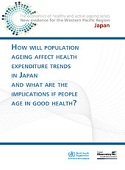How will population ageing affect health expenditure trends in Japan and what are the implications if people age in good health? (2020)

Download
Our analysis finds that population ageing in Japan will result in an increase in health expenditures as a share of GDP by 2.59 percentage points between 2020 and 2060, an average increase of 0.06 percentage points per year. This suggests that population ageing on its own is not, and will not become, the primary driver of growth in health expenditure in Japan. Nevertheless, our projections rely on current health expenditure patterns that reflect what has been achieved with the existing levels of health systems capacity and utilization rates. If per capita health spending levels for older age groups were to increase in the future, it is possible that the impact of population ageing in health expenditures may be greater than anticipated.0.000.010.020.030.040.050.060.070.08Healthy Ageing Premature morbidityAgeing baselineAverage annual inicrease in health expenditure as a share of GDP.
One factor that may cause health spending by age patterns to change in the future is the health of people at older ages. If the population on average ages in better health than currently, per person health spending for older age groups may be less than it is now. Conversely, people ageing in worse health may cause health expenditures for older age groups to be even higher. In recognition that variations in health status matter for spending by age patterns, we simulate two scenarios assuming healthy or unhealthy population ageing in the future. Our findings indicate that premature morbidity in the population would see health spending as a share of GDP increase by 2.92 percentage points between 2020 and 2060, but healthy ageing would see growth of 2.22 percentage points over the same period. This suggests that policies to promote healthy ageing can help to reduce growth in health spending as a result of population ageing.





















